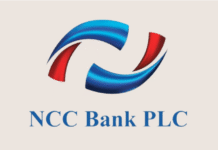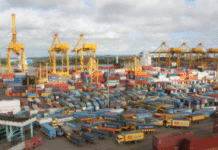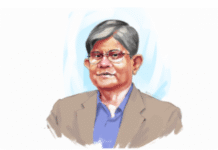
A file photo shows a grocer sitting inside his grocery in Dhaka. The point-to-point inflation rose by 0.44 percentage points and stood at 5.72 per cent in the fourth quarter of the just-ended fiscal year 2016-17 from that of 5.28 per cent in third quarter of the year. — New Age photo
The point-to-point inflation rose by 0.44 percentage points and stood at 5.72 per cent in the fourth quarter of the just-ended fiscal year 2016-17 from that of 5.28 per cent in third quarter of the year due mainly to price hike of food items like rice amid flash floods, national budget and Ramadan.
According to the data of Bangladesh Bureau of Statistics, both food and non-food inflation also increased in April 17-June 17 period compared with that of January 17-March 17 period on rising prices of both food and non-food items.
Food inflation and non-food inflation stood at 7.27 per cent and 3.47 per cent respectively in the last quarter which were 6.75 per cent and 3.12 per cent respectively in the third quarter, the data showed.
Prices of food items like rice, beef, mutton, vegetables, green chilli, vegetable oil and milk and expenditure for non-food items like clothes, energy and electricity, house rent, furniture and household items, medical service, transport and educational materials increased in the period, it said.
Planning minister AHM Mustafa Kamal on Tuesday revealed the inflation data at the post-ECNEC press briefing held at NEC auditorium at Sher-e-Bangla Nagar in Dhaka.
Kamal said that the prices of some food items increased in the quarter after sudden flash floods in Haor areas, announcement of national budget and celebration of holy Ramadan and Eid-ul-Fitr.
But the good news is that the prices of food items started to decline, he said.
Monthly inflation data, however, was not available as the statistical wing of the planning ministry stopped released the data since March and introduced quarterly inflation data in line with instruction of the planning minister which sparked severe criticism among economists and researchers.
The point-to-point inflation both in rural and urban areas increased to 5.49 per cent and 6.16 per cent respectively in the last quarter from 5.08 per cent and 5.65 per cent respectively in previous quarter.
According to the BBS, annual average point-to-point inflation, however, declined to 5.44 per cent in the FY 2017 from that of 5.92 per cent in previous FY 2016.
The government had set the target of containing inflation to 5.8 per cent in the year.
Annual food inflation significantly increased to 6.01 per cent in the last fiscal year from that of 4.90 per cent in previous fiscal year.
On the other hand, annual non-food inflation dropped to 4.61 per cent in FY 17 which was 7.43 per cent in FY 16, according to the data.
At the briefing, Kamal also said that the government’s development expenditure for the first time crossed the mark of Tk 1 lakh crore in the just concluded FY 2017 which is a milestone for the country.
The progress in implementation of the annual development programme, however, hit an eight-year low in the year as the government agencies could spend only 89.34 per cent or Tk 1,06,820 crore of the total allocation of Tk 119,296 crore, according to the Implementation Monitoring and Evaluation Division of the planning ministry.
The previous lowest progress in ADP implementation was 86 per cent in the FY 2009.
The ADP implementing agencies implemented 92 per cent of total allocation in the FY 2016.
Kamal said that the rate of implementation remained lower in the year as the government did not cut the original allocation in the revision though historically every year the original allocation is revised down.
The implementation rate would also create new record, if the allocation would revise down, he claimed.
Source: New Age









